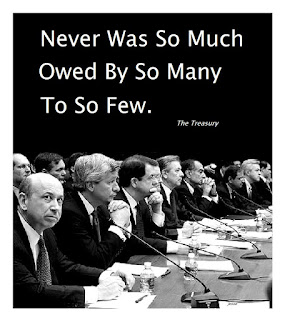I agree with David Lindorff in his excellent piece, An Oh Please Moment, that the timing of the SP downgrade of US debt is highly questionable.
"Either S&P has been pressured by powerful Republicans and/or Wall Street Bankers to issue this warning, in order to add to national hysteria about the national debt and win more drastic cuts in social programs, or S&P is simply blowing it again."Since the Ratings Agencies quite obviously have been in the pocket of the Wall Street monied interests for some time now, generating ratings on command for pay, there is much less question in my mind about which of the two alternatives are correct.
The bankers, having obtained huge sums of personal wealth by buying the government and looting the Treasury, are engaged in an aggressive campaign to make sure they can keep their ill gotten gains, without indictment, and pigs that they are, without any of the pain to be obtained from gaming the US financial system in a massive fraud and causing its collapse. They seek to direct that pain quite squarely and unashamedly on the lower and middle classes, while increasing their wealth by promoting even greater tax benefits and indirect subsidies from the public. When one does not prosecute crimes, it emboldens the perpetrators to ever greater excesses.
But I find myself, as always it seems, in the middle again, not being quite comfortable with some of the counter-arguments being made about the SP downgrade and its dodgy motivations.
"As Galbraith explains it, “US debt consists of bonds issued in US dollars, which I assume the S&P analysts know. How can the US possibly default on its own currency? The obligation is in nominal dollars, which is to say when the bond retires, the US issues a check in dollars to cover it.”This is technically correct, and underpins much of what is described of late as modern monetary theory.
Since the US prints its own currency (or actually just issues electronic payments to create new money) whenever it needs it, as Galbraith puts it, “As long as there is diesel fuel to power up the back-up generators that run the government’s computers, they will have the money to back their own bonds.”
Since the interest and bonds are denominated in dollars, the US has the ability to print dollars at will without an effective external constraint since it 'owns' its currency. The US is not answerable to some external standard like gold, or even a foreign central monetary authority with its own set of rules per se as in the case of Greece and the ECB. On paper at least the US is answerable to the Fed, which in theory is an independent constraint on limitless spending emulating a gold standard, in the words of that monetary whoremaster Greenspan.
And so the particular prognosis of SP not only smells of rank politics, pandering to the money class, but it is also patently absurd in what it says. The US is not risk of default. But it is at risk of a de facto default.
David Lindoff goes on to say quite insightfully:
"The problem will come when the dollar starts to seriously erode against other currencies because too much of the currency has been put into circulation. When that happens, there may be a shift away from the dollar as the world’s “reserve currency.” Looking further, one could then imagine the US being unable to issue debt to foreign investors, because they would no longer want to be left holding dollars, and the US would have to either drastically reduce its debt, or borrow in foreign-denominated debt--say Yen or Euros or Renminbi."As I have said many times before, the limiting factor on the Fed's ability to create money is the value at exchange of its bonds, and the dollar which is merely a note of zero coupon and duration.
The debt will be discharged, whether through payment or default. And monetary inflation is most often the soft default method of choice. The debt will be discharged. The crux of the matter is how the discomfort if not outright pain will be allocated. So far it is all carrot and few sticks to the creditors.
Mark Thoma captured the essence of the entire situation brilliantly and in a few words, quite nicely here:
"I am not as worried about the ability of the political process to deal with our long-run debt problem as S.&P. appears to be. One way or the other, the process will resolve this, especially since the public is demanding action. (I have to admit I am not quite so confident that they will not just kick the can down the road even further given the opportunity. Political campaign reform is needed, and badly, and the Fourth Estate is in occupied territory. - Jess)What concerns me is that the focus of the discussion seems to be solely on allocating the pain, with the monied interest pressing their advantage, but few are talking anymore about the need to reform the system as the sine qua non.
Don't let the downgrade allow those with wealth and power to push through the wrong solution. I am more worried about who will be asked to pay the costs of reducing the long-run debt to a more manageable level. Will we balance the books on the backs of those least able to pay and least able to defend themselves in the political process -- the sick, the poor, the elderly and children? Or will we ask those higher up on the income and wealth ladders to pay a significant part of the bill?"
We can pour stimulus and subsidy into this broken and distorted system until the cows come home and the US resembles postwar England. But on the other hand, we can engage in draconian austerity until we recreate Dickensian London, with scarecrows of children doing awful labor until they meet an early death, with heartbroken families living in the streets and debtors prisons, while the Scrooges of Wall Street glory in their superior intellectual and predestined moral fiber to have avoided such a fate, which they cleverly promoted themselves through their financially based criminal enterprises.
But it will not, ever, result in a sustainable economic recovery, and a stable society without significant government abuse of individual freedoms.
Most likely the result will be a protracted stagflation, similar to what Japan endured and continues to endure, but with inflation replacing deflation because the US is a net importer running a trade deficit. There will be endless war because besides financial fraud that is the US' other major industry. And behind it all will be a growing domestic unrest and official repression, provocation and reaction.
Reform is not being discussed because the status quo is already moving on, and the few real reformers have been artfully co-opted by the ultra-rich, with the result as Matt Taibbi, himself a star in the truth-telling firmament, so colloquially puts it here:
"My own personal view on this is not so much that Tea Partiers are racists, but more that they're tremendous pussies. They have no problem puffing out their chests and screaming bloody murder about Mexicans or single black Moms taking their tax money for emergency room care or school lunches. But when John and Christy Mack rob them to buy mansions on the Upper East side, you suddenly can't find a Tea Partier within a thousand miles -- can't find one with the Hubble space telescope. For all their bluster and aggressiveness, billionaires make them go weak in the knees."I personally don't think they are cowards at all, having shown the guts to face a hard life and carve a living out of it. Rather, and I have cited this phenomenon several times in the past, it is the vulnerability of the dark side of human nature to temptation, and being badly used. When the going gets tough, it is a natural reaction among many to kick the guy below you in the face, and try and knock him off the ladder before he can knock you off, and curry favor with those above in the hopes that they will accept you.
That is why there are things like religion and education and societal values which try to help people outgrow their schoolyard mentalities, and baser impulses to cheat and steal and lie, and to mature as human beings. Or at the very least, why there are laws and regulations to restrain those who for one reason or another are broken people but still functional enough to do others harm. Anyone who believes in the natural goodness of people in crowds lives in a world of theory and delusion, and at the very least must have never driven on a modern freeway in rush hour.
I also think there is quite a bit of prejudice and unfairness directed at the Tea Partiers by the bi-coastal elite, who are not all that different from them except in taste and fashion, not so much as they might like to imagine anyway. People are indeed sinful creatures, and one can find something wrong with anything that is wrought by them. But there is a redeemable wonder in most people as well, if one will only seek for it, cultivate it, and not try and push them down and use them badly, and enslave them.
And perhaps the real cowards are those of the privileged and the educated class who had taken the oaths and accepted the stewardship, noblesse oblige, and were in the best position to actually speak out when the Fed and the government started creating serial asset bubbles, and allowing rampant fraud, and egregious government lies that took the country to unfunded wars, and maintained their silence either out of complicity or fear or a reflexive desire to defend the status quo which had kept them and sustained them, rewarded them. Greenspan was able to engage in monetary and regulatory abuses for a long time because the thought leaders and power brokers were beneficiaries of his actions and fearful of his increasingly powerful bureaucracy, almost in the manner of a latter day Herbert Hoover.
Where are these people now, except for a few brave and notable souls deserving of encouragement and support, with regard to the increasingly obvious and blatant manipulation of the markets and prices, the legal abuses of the foreclosure process, the excessive fees and dangers of the leviathan banking system, and the growing body of evidence to support it? Who is asking for the CFTC and SEC to do their proper job? The Tea Partiers are the class of the overlooked and the relatively powerless, who know something is wrong, but are not sure what to do about it. The apathetic timidity of those who know better allows a vacuum to be filled by the new Huey Longs of the Right whom they descry. Could the mainstream media be any more compliant or benign to corruption, when not performing the function of outright propaganda and cheerleading for it?
Although a fiat currency might give Americans the euphoric feeling of independent and limitless wealth on command, it just does not work that way. The US has been gifted a deep and resilient economy and culture, bought over many years by blood and sweat and sacrifice.
It will take a monumental effort to bring it down, but I think the crony capitalists and oligarchs are up for the job if the people allow it, through complicity and sheer mean-spirited foolishness, but most likely apathy. The problem with this sort of large, complex system is that it collapses so slowly and in stages that the participants don't seem to notice it happening, until some weight reaches a critical point, and the bough breaks, and the heavy burdens of the past all come down in a rush that none can withstand, or probably even understand, until they are standing in ruins.

































